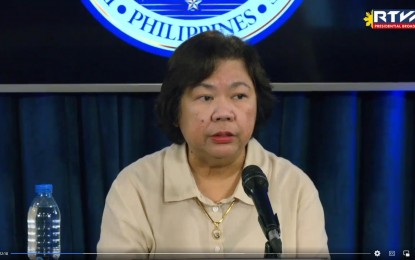
Department of Migrant Workers Secretary Susan Ople (File photo)
MANILA – To strengthen the rights and welfare of land-based overseas Filipino workers (OFWs), the Department of Migrant Workers (DMW) signed on Friday new rules and regulations that are easier to understand, not only by the recruitment agencies but by the migrant workers themselves.
Extensive consultations with stakeholders under the principle of social dialog and tripartism resulted in the 2023 Rules and Regulations Governing the Recruitment and Deployment of Land-based Filipino Workers, balanced and simplified to adhere to day-to-day operations and concerns of OFWs, according to DMW Secretary Susan Ople.
“Dahil mas simple ang rules, mas malinaw din ang dapat gawin at sundin ng bawat licensed recruitment agency. Hindi na kailangang humanap ng padrino sa loob o labas ng department (Because the rules are simpler, it is also clearer what each licensed recruitment agency must do and follow. There is no need to look for a sponsor inside or outside the department),” Ople said during the signing.
“We aim for a rights-based approach and ease of doing business mindset to labor migration and migration governance. This new set of rights-based rules will ensure better protection and empowerment of our OFWs. Likewise, it will enable the industry to succeed and flourish.”
She explained that the Philippine Overseas Employment Administration (POEA) already has an existing rule on the hiring of both land-based and sea-based OFWs.
However, Ople said that when she was tasked by President Ferdinand R. Marcos Jr. to head the newly created department, she found the old rules difficult and complicated.
Following the directives issued by Marcos during his inaugural State of the Nation Address last year, Ople said that they immediately worked on the simplification of the rules.
“Klinaro namin kasi maski ako nung pagkaupo ko binasa ko ‘yung land-based rules, ang napansin ko, una di ko natatapos kasi inaantok ako. Pangalawa hindi ko maintindihan kaya ilang beses na balikan. Pangatlo, wala akong maalala kahit nabalikan ko na (We clarified it because even when I sat down to read the land-based rule, what I noticed was, first I couldn't finish it because it made me sleepy. Secondly, I didn't understand it so I had to go back to it several times. Thirdly, I couldn't remember anything even though I’ve read it several times),” she said.
Ople said they had to remove the “mystery” because rules should not be mysterious and made a shorter version.
Cardinal sins
Ople said the new rules provide 20 cardinal sins that may lead to the cancellation of a recruitment agency’s license, adding that the list of serious offenses was drawn up in consultation with various stakeholders.
The list includes acts of graft and corruption, including attempts to bribe DMW officials and personnel and the recruitment and deployment of minors and underaged workers.
Licensed recruitment agencies are required to employ a full-time and trained Welfare Desk Officer who will monitor and assist in resolving problems and complaints at job sites.
Ople said the new rules also seek to regulate the accommodations of recruitment agencies for its workers.
"This is significant because there was no way for the government to know where these accommodations are and how conducive its facilities are for our workers. Under the new rules, they would have to inform us about the location and capacity of these accommodations," she said.
The new DMW rules impose a simplified and standardized penalty structure for private recruitment agencies for offenses, such as involvement in corruption activity, and any conduct of illegal recruitment and trafficking in persons.
For serious offenses, the recruitment agency faces cancellation of its license, while less serious offenses will result in a suspension of six months to one year.
Meanwhile, agencies with light offenses will face suspensions of one to six months.
The validity period of provisional licenses has also been extended from two years to three years, while the validity of a regular license has been extended to six years from the previous four-year period.
The escrow deposit of recruitment agencies has also been increased from PHP1 million to PHP1.5 million to expand their capability to cover claims of OFWs over employment contract violations.
One-Person Corporations are now allowed to engage in overseas recruitment and employment.
The DMW likewise shortened its process-cycle time from 15 days to seven to 10 days for onsite accreditation and verification in its Migrant Workers' Offices overseas. (PNA)
